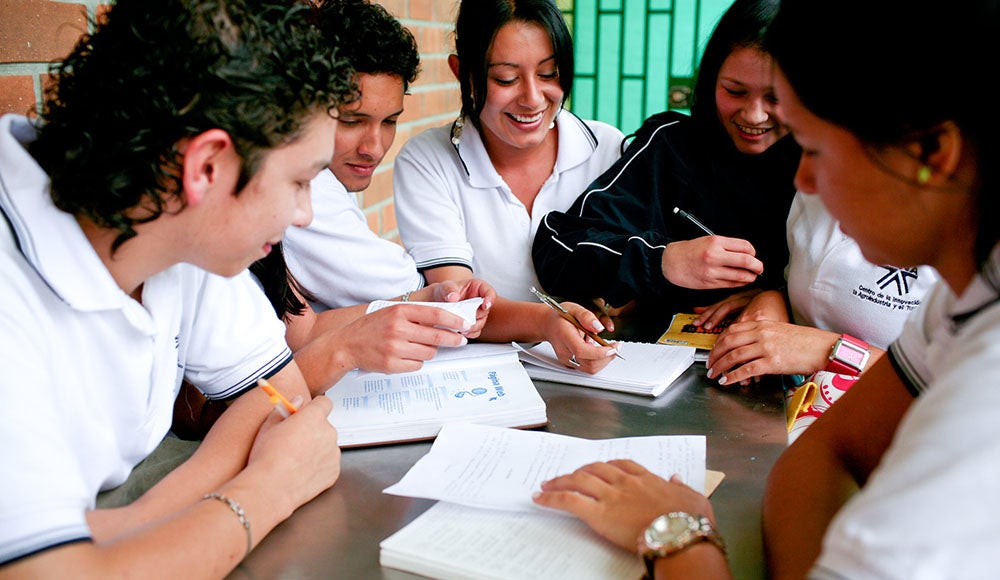 Students in a technical education program in Colombia.
Students in a technical education program in Colombia.
Youth aged 15-24 make up 1.2 billion people in the world and it is projected to increase to 1.3 billion by 2030, with some countries and regions experiencing rapid growth, or so-called “youth bulges.” More than one million young people enter the labor market each month in India and in sub-Saharan Africa.
This places enormous pressure on economies and societies to generate both more and better jobs for young people and relevant skills for those jobs. Even before the COVID-19 crisis hit in 2020, young workers were two to four times more likely to be unemployed compared to older workers, and more than 230 million youth – mostly women – were not in employment, education, or training (NEETs).
The 2021 World Youth Skills Day reminds us that ensuring quality skills development opportunities for youth should remain a top policy priority around the globe. Too many countries, especially in low-income contexts, are still struggling to deliver quality basic education. Even before the pandemic, 53 percent of 10-year-olds in developing countries were in “learning poverty,” as they were unable to read and comprehend a simple text. At the same time, the 21st century labor market calls for increasingly advanced skills as many jobs experience automation of repetitive or routine tasks. This means that education and training systems are pressed to develop skills such as adaptability, persistence, problem-solving, and digital skills, in addition to foundational literacy and numeracy as well as technical skills.
COVID-19 has deepened the learning and skills crisis due to school closures and inadequate preparedness in most countries to provide continuity of learning outside the classroom. As a result, this generation of students, and especially the more disadvantaged, stands to lose an estimated $16 trillion in future lifetime earnings. The ones most likely to be affected by this crisis are children and youth in low-income households, disempowered ethnic minorities, refugees and displaced populations, and girls. Young women have had to shoulder a disproportionate share of household responsibilities and have likely faced an increased risk of gender-based violence, early marriage, or adolescent pregnancy, which can affect their likelihood of returning to school.
The COVID-19 crisis can be a turning point in youth skills development, propelled by the rapid expansion of technology-enabled solutions. Given the massive challenges, 2020 sparked intense creativity for skills development. Education and training providers used innovative solutions and established novel partnerships to deliver learning to youth when schools and training centers were shut down by the pandemic. There is an opportunity to reflect on lessons learned from this experience and to harness the potential of education technology in a systematic and sustainable way. Two lessons stand out. First, to promote equity and inclusion and prevent any further widening of human capital gaps, skills development solutions need to be tailored to the learning and skills needs of a vastly heterogenous population. Second, to fulfill their mandate and youth labor market aspirations, education and training systems need to become more agile and responsive to the changing world of work.
Last week, we had a chance to reflect on these issues as part of the High-level Policy Forum organized by Association for the Development of Education in Africa, in partnership with other development partners. In this event, ministers of African countries spoke of the challenges their Technical and Vocational Education and Training (TVET) systems experienced in recent years, including mismatches between graduates’ skills and labor market needs and the fragility exposed by the COVID-19, and the strategies to steer TVET systems that can meet current challenges and future skills needs.
Several takeaways emerged from a deep-dive discussion on the role Educational Technology (“EdTech”) can play in reimagining skills development. The expansion of EdTech, spurred by the Fourth Industrial Revolution and accelerated by the COVID-19 crisis, is transforming how people engage with learning and increasingly making it an essential feature of a well-developed national TVET system. As an example, OpenClassrooms, an online learning platform available in North Africa, illustrates how EdTech can offer new ways to customize the learning experience, allow developing countries to integrate world-class training content, and enhance skills recognition and transferability across markets. Effective EdTech approaches cannot flourish without partnerships between public and private sector and without an enabling environment that includes digital infrastructure and digital skills of learners and teachers. The Bank is leveraging such solutions to support TVET regionalization and integration such as in the East Africa Skills for Transformation and Regional Integration Project (EASTRIP) and in Nigeria. Stakeholders in the skills development ecosystem, such as instructors and directors of brick-and-mortar institutions, could perceive the rapid growth of EdTech as threatening. It is therefore essential to communicate the tremendous scope for complementarities, particularly in the context of the great needs for skilling, reskilling, and upskilling the current and future workforce.
Creating better jobs and investing in relevant and inclusive education and training is a priority to achieve successful transitions from school to work. It is equally critical though, to think how we can create more dynamic and real-time feedback loops between labor markets and skills development systems to improve young people’s prospects for employment. For this, mechanisms to provide information on the pay off in the labor market of different fields of study and close partnerships between training providers and employers are key, and fostering these is a priority item for TVET reform.
We must also support access to better jobs for particularly disadvantaged youth, including young women, minority groups, persons with disabilities, or displaced populations. That means working to eliminate the multiple barriers that prevent these young (future) workers from acquiring the skills they need and obtaining more sustainable and productive livelihoods. This is a huge agenda, made even more urgent by the pandemic, and we need to work together as an international community to reimagine skills development systems so they can support an inclusive recovery around the world.



Join the Conversation